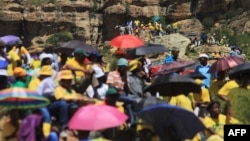Lesotho will choose a new National Assembly, including its next prime minister, Saturday (February 28). The poll is being called more than two years early to restore stability after an attempted coup in August. That political power play exposed a gaping fault line between Lesotho’s military and the police - which have become highly politicised. Some analysts suggest the snap election - mediated by the Southern African Development Community (SADC) - is not necessarily going to solve Lesotho’s political and security problems.
Political insecurity has plagued the landlocked kingdom throughout its near half-century of independence. The 2014 August coup attempt followed five others as well as a series of attempted political assassinations. Election-related unrest in 1998 killed 113 people, including members of the South African Air Force that had intervened to calm the crisis.
The formation of a coalition government in 2012, led by Prime Minister Thomas Thabane, was considered an attempt to reduce political tension.
But the tripartite coalition buckled when Thabane declared a 10-month suspension of parliament in June after the opposition attempted to pass a motion of no-confidence in him.
Subsequently, a military faction, led by army commander Tiali Kamoli, attempted to topple Thabane’s government in August - forcing the prime minister into exile in South Africa.
Despite the political blow, Thabane is running again for the top seat representing his party - the All Basotho Convention (ABC).
Thabane’s main rival is Deputy Prime Minister Mothetjoa Metsing, from the Lesotho Congress for Democracy (LCD), which the premier accused of propelling the coup attempt with the military faction.
Former prime minister and candidate for the Democratic Congress (DC), Pakalitha Mosisili, is also a strong contender.
Fears of pressure
Analysts are questioning how these elections - brought forward more than two years early - will solve any of the country’s underlying problems. Furthermore, politicising the country’s security apparatus has led to its deterioration and a particularly hostile relationship between the military and police, says Dimpho Motsamai, analyst for the Institute for Security Studies in Pretoria.
“You still have the group within the military that supported Kamoli, that has orchestrated the violence… they are not disarmed. So there are a lot of question marks about how the military will be involved in the elections… the military has been used by political parties to pursue certain agendas. It cannot be ruled out this may happen again,” says Motsamai.
A directive from the SADC, which deployed a peace mission to Lesotho last year, said the army must remain in its barracks on election day. But a press release from the Lesotho Defence Force on February 13, stated that soldiers would continue to patrol “as usual.”
SADC’s critics say that the regional bloc has done little to improve relations between the army and the police, focusing instead on a political quick fix.
An indecisive vote is likely. Lesotho uses the Mixed Member Proportional Representation Model (MMP), which is a combination of first past the post and proportional representation and is a system highly susceptible to producing hung parliaments, Motsamai says.
“MMP is seen as a solution to disproportionate electoral outcomes…[it is] seen as a solution to abating election-related violence… [but] it tends to not produce a decisive win; that then becomes a problem - the problem of coalition government and that effectiveness in working together,” says Motsamai.
An indecisive vote could lead to a coalition between the LCD and the DC parties, analysts say. But their alliance is one that would be born from political expediency - the party’s candidates have been embroiled in leadership battles in the past.
A coalition built on convenience could see another bout of turbulent politics, says analyst Gary van Staden, from Africa research company, NkC.
“There was always a kind of ‘let’s work together for the moment and see how things pan out’… it is disastrous. If the heavyweights are not included in the coalition with a serious trunk of power, I think, again, it will fall apart,” says von Staden.
South Africa is particularly keen to restore lasting stability as Lesotho provides water to Gauteng, one of the South Africa’s richest provinces that includes Johannesburg. The National Treasury predicts that demand for water will outstrip supply between 2025 and 2030 but a joint water project with Lesotho will boost South Africa’s water by 50 percent in eight years.




